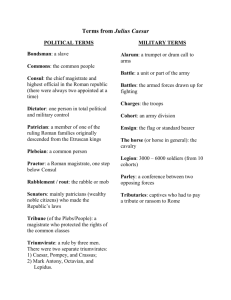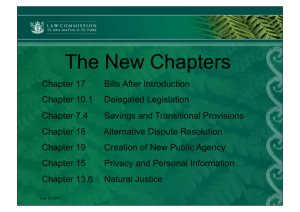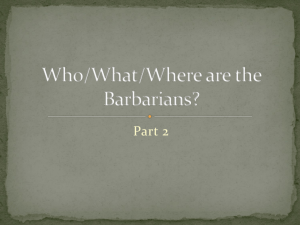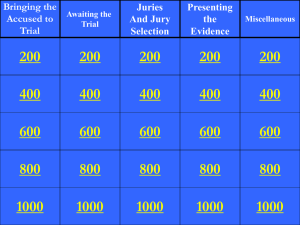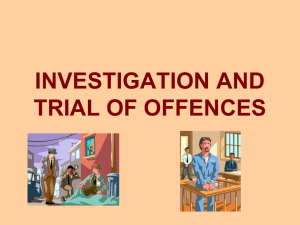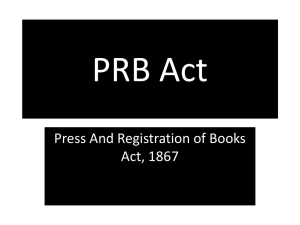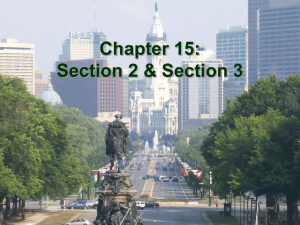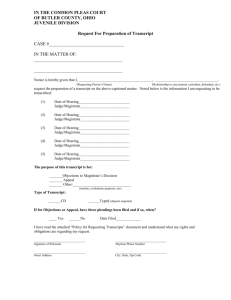ANTIGUA AND BARBUDA THE MAGISTRATE’S CODE OF PROCEDURE (AMENDMENT) ACT, 2004
advertisement
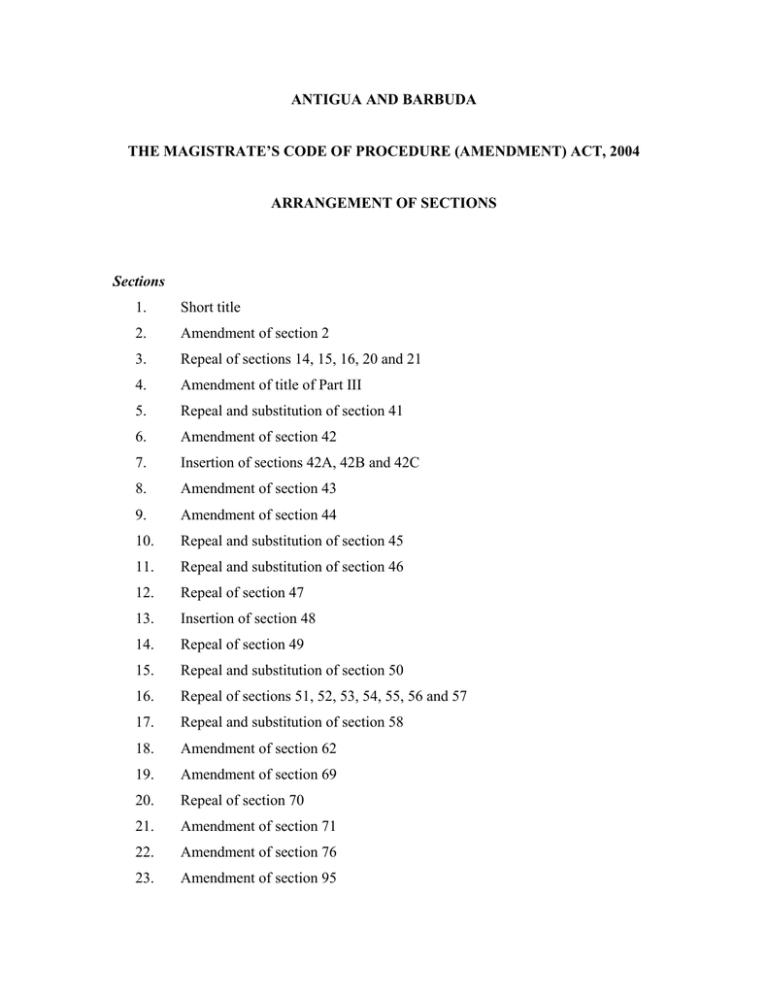
ANTIGUA AND BARBUDA THE MAGISTRATE’S CODE OF PROCEDURE (AMENDMENT) ACT, 2004 ARRANGEMENT OF SECTIONS Sections 1. Short title 2. Amendment of section 2 3. Repeal of sections 14, 15, 16, 20 and 21 4. Amendment of title of Part III 5. Repeal and substitution of section 41 6. Amendment of section 42 7. Insertion of sections 42A, 42B and 42C 8. Amendment of section 43 9. Amendment of section 44 10. Repeal and substitution of section 45 11. Repeal and substitution of section 46 12. Repeal of section 47 13. Insertion of section 48 14. Repeal of section 49 15. Repeal and substitution of section 50 16. Repeal of sections 51, 52, 53, 54, 55, 56 and 57 17. Repeal and substitution of section 58 18. Amendment of section 62 19. Amendment of section 69 20. Repeal of section 70 21. Amendment of section 71 22. Amendment of section 76 23. Amendment of section 95 24. Repeal of section 100 25. Amendment of section 150 26. Insertion of Part VIII A 27. Repeal of First Schedule 28. Amendment of Second Schedule 29. Amendment of section 56 of the Interpretation Act 30. Repeal of the Criminal Procedure (Committal for Sentence) Act 2 ANTIGUA AND BARBUDA No…….of 2004 THE MAGISTRATE’S CODE OF PROCEDURE (AMENDMENT) ACT, 2004 A BILL FOR Published in the Official Gazette Vol……..No…..dated…………… AN ACT to amend the Magistrate’s Code of Procedure Act. ENACTED by the Parliament of Antigua and Barbuda as follows: Short title 1. This Act may be cited as the Magistrate’s Code of Procedure (Amendment) Act, 2004. Amendment of section 2 Cap. 255 2. The Magistrate’s Code of Procedure Act, in this Act referred to as “the principal Act”, is amended in section 2 by the deletion from the definitions of “adult”, “child” and “young person” of the words “age of sixteen years” and the substitution of the words “age of eighteen years”. Repeal of sections 14, 15, 16, 20 and 21 3. Sections 14,15, 16, 20 and 21 of the principal Act are repealed. Amendment of title of Part III 4. The principal Act is amended in Part III by the deletion of the title of that Part and the substitution of the following: “COMMITTAL PROCEEDINGS” Repeal and substitution of section 41 5. Section 41 of the principal Act is repealed and the following substituted: “Definition of 41. “committal proceedings” and “deposition” (1) In this Act, “committal proceedings” means proceedings under this Part for the committal of a person accused of an indictable offence for trial by jury. 3 (2) For the purposes of this Act and any other law, a reference to a deposition in relation to committal proceedings shall be construed as a reference to any statement admitted in evidence in committal proceedings under this Act.” Amendment of section 42 6. Section 42 of the principal Act is amended by the deletion of the words “a preliminary inquiry” and the substitution of the words “committal proceedings”. Insertion of sections 42A, 42B and 42C 7. The principal Act is amended by the insertion, immediately after section 42, of the following sections: “Institution of 42A. committal proceedings (1) All committal proceedings shall be instituted under the direction of the Director of Public Prosecutions by the filing of – (2) Accused may 42B. file statements in reply (a) one or more written statements of witnesses in support of the charge; and (b) a list of exhibits, if there are any exhibits which the prosecution intends to produce in connection with the proceedings. The Director of Public Prosecutions shall, as soon as practicable, cause the documents filed under subsection (1) to be served on the accused person. (1) After the documents under section 42A(1) have been served on the accused person and within such period as may be specified by a Magistrate, the accused may, in reply, file his own statement and any statement of his witnesses and a list of exhibits, if there are any exhibits which the accused person intends to produce in connection with the proceedings, but failure by the accused person to file any documents or the lack of any such documents shall not, in itself, affect the power of the Magistrate 4 to proceed with and conclude the committal proceedings or to take any other action permitted by this Act. (2) Committal 42C. on written statements only The Court shall cause the reply filed under subsection (1) to be served on the Director of Public Prosecutions. A Magistrate holding committal proceedings may commit an accused person for trial by jury on a charge of an indictable offence if he is satisfied that either the charge supported by the evidence in the documents filed under section 42A(1) alone or in conjunction with any documents filed under section 42B(1), establish or are likely to establish the indictable offence charged or an indictable offence of a like kind which is not otherwise within his jurisdiction to deal with summarily.” Amendment of section 43 8. Section 43 of the principal Act is amended by the insertion immediately after the word “guardian” of the words “or an adult next of kin”; Amendment of section 44 9. Section 44 of the principal Act is amended by the insertion, immediately after the word “guardian” wherever it appears, of the words “or an adult next of kin”. Repeal and substitution of section 45 10. Section 45 of the principal Act is repealed and the following subsection substituted: “Offences triable 45. either on indictment or summarily (1) Where an adult is charged with an offence that is, by virtue of any enactment, both an indictable offence and a summary offence, the prosecution shall, inform the Magistrate dealing with the charge in the presence of the accused person whether the charge is to be tried on indictment or summarily and the Magistrate may make an order to deal with the case in accordance with that information. 5 Repeal and substitution of section 46. 11. (2) Where the person charged fails to appear to answer the charge, the information required to be given by the prosecution under subsection (1) may be given in his absence. (3) Before making an order under subsection (1), the Magistrate shall give the accused person an opportunity to show cause, by way of submission only, why the order should not be made. (4) This section shall not be construed as affecting the operation of section 46. Section 46 of the principal Act is repealed and the following section substituted: “Adult pleading 46. guilty or consenting, to be tried summarily in certain cases (1) Where an adult is charged with an indictable offence in respect of which the penalty prescribed by law does not exceed any of the following: (a) a fine of $10,000; or (b) a term of imprisonment for twenty-four months, and the accused person pleads guilty or consents to the case being dealt with summarily, the Magistrate shall deal summarily with the offence and, notwithstanding any other law, may impose such penalty not exceeding the penalty prescribed for the 6 offence as appropriate. (2) he considers In every case to which subsection (1) applies, the Magistrate shall, after reading the charge to the accused person, question him to the following effect: (a) “Do you plead guilty to the charge?”; and (b) if the accused person does not plead guilty: “Do you wish to be tried by jury or do you consent to your case being dealt with summarily?” and shall explain to the accused, if necessary, the meaning of the case being dealt with summarily or by a jury.” Repeal of section 47 12. Section 47 of the principal Act is repealed. Insertion of section 48 13. The principal Act is amended by the insertion, immediately after of section 48, of the following section: “Substitution 48 of indictable charge of a like kind (1) Subject to subsection (2), where, in committal proceedings on a charge of an indictable offence the Magistrate is of the opinion that the evidence in the documents filed under section 42A(1) either alone or in conjunction with the evidence in the documents filed under section 42B(1) or any additional evidence in the documents filed under section 71 (3), an indictable offence of a like kind to the offence charged is established or appears likely to be established, the Magistrate may make such order for the alteration of 7 the charge by the substitution of another charge of an indictable offence of a like kind to the offence charged as he thinks necessary in the circumstances of the case unless the order cannot, in his opinion, be made without causing injustice; and the Magistrate shall thereafter proceed to deal with the case as provided for in this Act in relation to indictable offences. (2) Before making an order under subsection (1), the Magistrate shall give the prosecution and the accused person an opportunity to show cause, by way of submission only, why the order should not be made.” Repeal of section 49 14. Section 49 of the principal Act is repealed. Repeal and substitution of section 50 15. Section 50 of the principal Act is repealed and the following section substituted: “Power to adjourn or remand 50. Where a person is charged with an indictable offence, the Magistrate may, during committal proceedings, from time to time adjourn the case and remand the accused person.” Repeal of sections 51, 52 53, 54, 55, 56 and 57 16. Sections 51, 52, 53, 54, 55, 56 and 57 of the principal Act are repealed. Repeal and substitution of section 58 17. Sections 58 of the principal Act is repealed and the following section substituted: “Final decision on committal proceedings 58. (1) At the conclusion of the committal proceedings, the Magistrate may, subject to subsection (2), make any of the following orders: (a) dismiss the charge and, if the accused person is in custody, make an order for his release; 8 (2) Amendment of section 62 18. commit the accused person for trial by jury; or (c) make any other order in relation to the case, the charge or the accused as provided for in this Act or in any other law. Before making an order under subsection (1), the Magistrate shall, on an application, give the prosecution or the accused person, as the case may be, an opportunity to show cause, by way of submission only, why the order should not be made.” Section 62 of the principal Act is amended – (a) by the deletion of subsection (3) and the substitution of the following: “(3) A Magistrate shall not admit to bail a person charged with any of the following offences: (a) high treason, misprision of treason and treasonable felony; (b) murder or attempted murder; (c) robbery or robbery with aggravation involving the use of a firearm; (d) an offence involving the possession or use of an offensive weapon; (e) unlawful possession of a firearm or ammunition or unlawful use of a firearm, contrary to any provision of the Firearms Act; (f) contravention of any condition attached to a licence, certificate or permit granted under the Firearms Act; Cap. 171 Cap. 171 (b) 9 (g) unlawful importation of firearms contrary to the provisions of the Firearms Act or any other law; (h) offences under the Sexual Offences Act. Cap. 171 Act No. 9 of 1995 (b) by the insertion, immediately after subsection (3), of the following subsection: “(4) (c) In paragraph (d) of subsection (3), “offensive weapon” includes any article made or adapted for, or capable of, causing bodily harm or damage to property and intended by the person having it with him for that use by him.”; by renumbering subsection (4) as subsection (5). Amendment of section 69 19. Section 69 of the principal Act is amended by the deletion of the words “At any time after all the witnesses have been examined” and the substitution of the words “At the conclusion of the committal proceedings”. Repeal of section 70 20. Section 70 of the principal Act is repealed. Amendment of section 71 21. Section 71 of the principal Act is amended – (a) (b) in subsection (2) – (i) in paragraph (b) by the addition, immediately after the colon, of the word “and”; (ii) in paragraph (c) by the deletion of the word “and”; and (iii) by the deletion of paragraph (d); by the repeal of subsection (3) and the substitution of the following: “(3) The Magistrate may, on an application by the prosecution or the accused person, allow either of them to file documents additional to the documents referred to in section 42A(1) or 42B(1), respectively, within such 10 period as may be specified by the Magistrate; and the documents shall be served on the other party and be treated in the same manner as the documents referred to in those sections.”; and (c) Amendment section 76 Amendment of section 95 22. 23. in subsection (4) by the deletion of the words “under section 70” and the substitution of the words “under section 42C”, Section 76 of the principal Act is amended – (a) in the marginal note, by the deletion of the words “more than six months” and the substitution of the words “more than two years or a fine exceeding $10,000”; (b) in the introductory part of the section, by the insertion, immediately after the words “two years”, of the words “or a fine exceeding $10,000”; and (c) in the first proviso thereto by the insertion, immediately after the word “guardian” wherever it appears, of the words “or an adult next of kin.” Section 95 of the principal is repealed and the following section is substituted: “Award of 95. compensation The Magistrate may, or an application by a person aggrieved and immediately after the conviction of the person charged, award any amount not exceeding $10,000 to the person aggrieved, in addition to any penalty, as compensation for personal injury or damage to property caused by the offence.” Repeal of section 100 24. Section 100 of the principal Act is repealed. Amendment of section 150 25. Section 150 of the principal Act is amended by the deletion of the words “the Second Schedule” and the substitution of the words “the Schedule”. Insertion of Part VIII A 26. The principal Act is amended by the insertion, immediately after section 191, of the following Part: 11 “PART VIII A APPEALS BY DIRECTOR OF PUBLIC PROSECUTIONS Interpretation 191A. In this Part, “judgment” includes an order, a ruling and a final decision of a Magistrate’s Court; Appeals by Director of Public Prosecutions 191B. (1) The Director of Public Prosecutions may, subject to subjection (2), appeal to the Court of Appeal from a judgment of a Magistrate’s Court in respect of – (2) Procedure, etc. for appeals by D.P.P 50C. (a) a verdict of acquittal or a sentence passed by a Magistrate’s Court; or (b) the dismissal of a charge against an accused person in committal proceedings. An appeal pursuant to subsection (1) may be made only on the following grounds: (a) in the case of a verdict of acquittal, on a point of law; (b) in the case of a sentence, on the nature or extent of the sentence, or both; and (c) in the case of the dismissal of a charge in committal proceedings, on a point of law or on a point of mixed law and fact, or both. The law applicable to appeals in criminal proceedings shall apply to the procedure and other matters in appeals by the Director of Public Prosecutions in the same manner as it applies to an appeal by any other person, except that the Director shall not be required – (a) to enter into a recognizance or to provide any other security; or (b) to pay any fees or costs.” Repeal of First Schedule 27. The First Schedule to the principal Act is repealed. Amendment Second Schedule 28. The Second Schedule to the principal Act is amended by the deletion, from its title, of the word “Second.” 12 Amendment of section 56 of Cap. 224 29. Section 56 of the Interpretation Act is amended – (a) Cap. 255 (b) Repeal of Cap. 118 30. by the insertion of the following definition: “committal proceedings” means proceedings under the Magistrate’s Code of Procedure Act for the committal of a person accused of an indictable offence for trial by jury;”; and by the deletion of the definition “preliminary inquiry”. The Criminal Procedure (Committal for Sentence) Act is repealed. Passed by the House of Representatives Passed by the Senate this this day of , 2004. D. Giselle Isaac-Arrindell Speaker Yvonne Henry Clerk to the House of Representatives day of , 2004. Dr. Edmond Mansoor President Yvonne Henry Clerk to the Senate 13 EXPLANATORY MEMORANDUM The principal object of this Bill is to amend the Magistrate’s Code of Procedure Act for the following purposes: (a) to improve and speed up the judicial process in the Magistrates’ Courts in relation to preliminary proceedings for the committal of accused persons for trial by the High Court; (b) to enable the Director of Public Prosecutions to appeal against the acquittal of, or a sentence imposed on, an accused person by a Magistrate’s court but only on points of law or on the nature or extent of a sentence, and also against the dismissal of a charge in committal proceedings. (c) to increase the jurisdiction of Magistrates in certain cases where an accused person, in the course of committal proceedings, pleads guilty or elects to be tried summarily by a Magistrate’s court for an indictable offence; and (d) to increase the number of serious offences in respect of which a Magistrate may not grant bail. Clause 2 of the Bill seeks to raise the age, from sixteen years to eighteen years, at which a person would be treated as an adult for the purposes of the Act. Clause 3 of the Bill would repeal certain provisions of the Act which are not in conformity with the principle of the independence of the judiciary by deleting from the Act all provisions allowing the bringing of a civil suit against a Magistrate for acts done in his official capacity. 14 Clauses 4 and 5 of the Bill are intended to alter the terminology relating to preliminary proceedings, from “preliminary inquires” to “committal proceedings.” Clause 7 of the Bill is designed to lay down the procedure for the institution and conduct of committal proceedings. The proposed provisions would require all such proceedings to be instituted under the direction of the Director of Public Prosecutions by filing a charge as well as the statements of witnesses and a list of exhibits in support of the charge. An accused person may then file documents in reply. On the basis of the depositions only and without oral evidence, a Magistrate holding committal proceedings may, subsequently, commit an accused person for trial if he is satisfied that the statements establish or are likely to establish an indictable offence. Clause 10 of the Bill would enable the prosecution to elect to have an “eitherway” offence tried summarily or on indictment, depending on the seriousness of the offence. An “either-way” offence is an offence which is, by law, triable indictably or summarily. Clause 11 of the Bill seeks to increase the jurisdiction of Magistrates by empowering a Magistrate to try “either-way” offences summarily where the offence is punishable by a penalty that does not exceed a fine of $10,000 or twenty-four months’ imprisonment and the accused pleads guilty or consents to have the offence tried summarily. Clause 13 of the Bill is intended to empower a Magistrate, having considered the evidence disclosed by the depositions tendered, to order the substitution of a kindred indictable offence for the offence with which the accused is initially charged if, in the opinion of the Magistrate, the alteration of the charge does not cause injustice. At every crucial stage of committal proceedings, the provisions proposed in this Bill seek to ensure that the interests of the accused are protected by requiring a 15 Magistrate to explain to the accused the substance and consequences of a particular option available to the accused and to give the accused an opportunity to show cause why the Magistrate should not make a particular order. Clause 16 of the Bill is intended to repeal sections 51 to 56 of the Magistrate’s Code of Procedure Act in order to dispense with oral evidence in committal proceedings especially in view of the new proposal in Clause 7 giving priority to written statements as the principal basis on which a decision in committal proceedings would be made. Clause 18 of the Bill sets out more clearly the offences in respect of which a Magistrate may not grant bail and also seeks to increase the number of such offences. Clauses 22, and 23 seek to increase the jurisdiction of Magistrates’ courts, including the raising of the amount payable by a convicted person, from $1,500 to a maximum of $10,000, as compensation for personal injury or damage to property. Clause 25 of the Bill would introduce into the Magistrate’s Code of Procedure Act new provisions empowering the Director of Public Prosecutions to appeal against a judgment of a Magistrate in respect of the acquittal of, or a sentence imposed on, an accused person or against the dismissal of a charge in committal proceedings. An appeal would be permissible in the case of an acquittal, on a point of law, in the case of a sentence, on the nature or extent of the sentence and in the case of a dismissal of a charge, on a point of law or on a point of mixed law and fact. Clause 27 of the Bill is intended to repeal the First Schedule to the Magistrate’s Code of Procedure Act which sets out the indictable offences in respect of which an adult can be tried summarily if he pleads guilty or consents to be tried summarily. That Schedule will be rendered irrelevant, if this Bill is enacted, by the increase of the penal jurisdiction of Magistrates proposed in Clause 9 of this Bill to try offences for which a maximum fine of $10,000 or a maximum term of twenty-four months’ imprisonment is prescribed by law. 16 Clause 29 of the Bill seeks to amend the Interpretation Act by replacing the definition of “preliminary inquiry” with a new definition of “committal proceedings”. Clause 30 would repeal the Criminal Procedure (Committal for Sentence) Act which will have been rendered redundant by the amendments proposed in this Bill. The Bill also seeks to make various amendments of a formal, consequential or incidental nature necessitated by amendments to other provisions of the Act. Done this……….day of………………………2004. Justin L. Simon, Q.C. Attorney-General and Minister of Legal Affairs. 17

